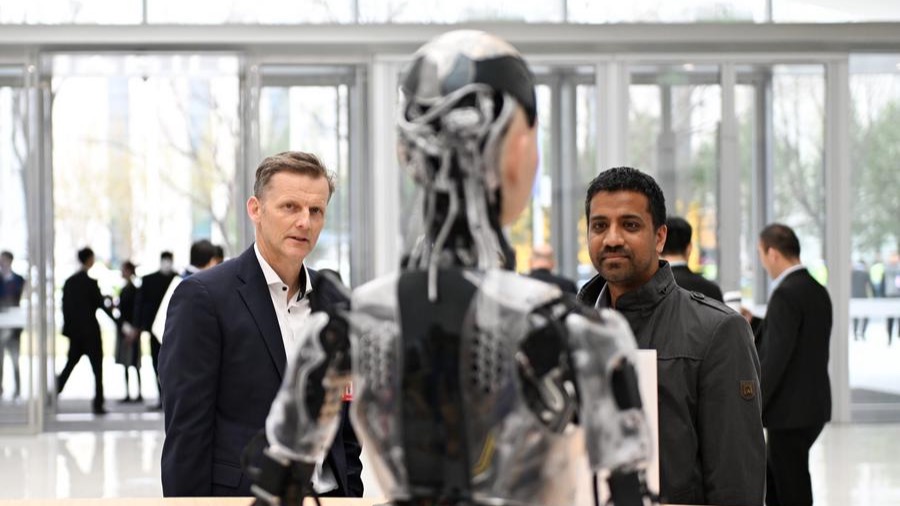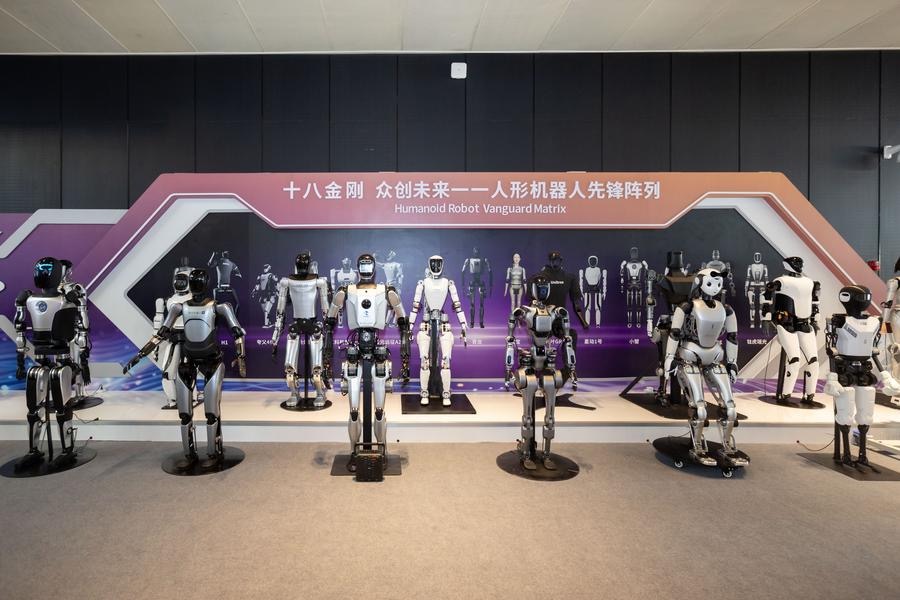Home > > Technology for good: Building a shared path in the age of AI
Technology for good: Building a shared path in the age of AI

People learn about a bionic humanoid robot at the Zhongguancun International Innovation Center in Beijing, capital of China, March 27, 2025. /Xinhua
The 2025 China-Europe Seminar on Human Rights will be held in Spain on June 25, presenting a valuable opportunity to once again reflect on our shared future.
Today's world is witnessing a tidal wave of technological revolution and industrial transformation. Emerging technologies, such as artificial intelligence (AI), big data and cloud computing, are continuously reshaping our visions of the future. In particular, AI has undergone exponential growth in recent years – from voice recognition and AI-generated content to humanoid robots.
As AI progresses rapidly toward artificial general intelligence, this technological upheaval is not only restructuring economic and social systems but also deeply influencing human lifestyles, values and even our understanding of human rights.
From sci-fi to everyday reality: How technology is reshaping daily life
Once confined to science fiction, drones, smart voice assistants and autonomous vehicles are now becoming part of our daily routines.
In agriculture, AI is merging deeply with China's rural development. For example, AI-supported agricultural drones provide plant protection services to more than 200 million mu (more than 133 billion square meters) of farmland every year. In logistics and delivery, drones, AI-powered scheduling systems and intelligent warehouses are being put into real-world operation. In cities like Shenzhen and Hangzhou, pilot programs for drone-based delivery services are steadily advancing. From high-altitude flights to last-mile precision drop-offs, AI is injecting unprecedented levels of efficiency into modern logistics.
In transportation, autonomous driving is transitioning from closed-environment testing to open-road trials. In China's major cities like Beijing, Shanghai, Guangzhou and Wuhan, robotaxis have started serving everyday passengers. Moreover, autonomous buses and freight vehicles are also spread to public roads in the U.S., Japan, Saudi Arabia, etc.
Meanwhile, with breakthroughs in machine vision, bionic structures and sensory control systems, humanoid robots enhanced by AI have moved from stage demonstrations to real-world applications. They assist with heavy lifting and precision inspections in factories, serve as caregivers in hospitals and senior care facilities and act as guides and companions in education and museums. In the near future, humanoid robots may become the "new blue-collar workers," entering households around the world.
Human rights and ethical dilemmas in the age of AI
Technology, however, is a double-edged sword. Elon Musk has repeatedly warned that AI without proper rules and boundaries could become a "Pandora's box." This cautionary statement carries weight.
One pressing issue is the profound restructuring of the job market. As AI gradually replaces repetitive, hazardous, or standardized jobs, segments of the workforce may find themselves marginalized. Ensuring the fair distribution of technological benefits is a challenge that must be addressed head-on.
Another concern is the growing problem of digital inequality. In an AI-driven economy, data becomes the core production asset and algorithms determine resource allocation. Those who control data and computing power gain competitive advantage. In this environment, low-income groups, rural communities and the elderly risk being excluded from the digital world – exacerbating existing social disparities and unequal access to rights.
As humanoid robots gain increasingly human-like capabilities, society faces a new wave of ethical dilemmas. Algorithmic "black box" effects, AI bias, information manipulation and misuse of deepfake technology are triggering global moral reflection and legal scrutiny.
In this evolving context, the concept of human rights must be broadened. Traditional frameworks must be modernized to fit the digital age. This transformation requires a holistic approach that integrates technology, ethics and governance – ensuring that progress in AI always serves human dignity and well-being.

Humanoid robots are on display during the 2024 World AI Conference in Shanghai, east China, July 4, 2024. /Xinhua
People-centered development and dual engines of innovation and regulation
Facing these challenges, China remains committed to the principle of "tech for good, tech for all," prioritizing human dignity and rights in the AI development.
On the infrastructure side, China's New Generation Artificial Intelligence Development Plan has rolled out 5G networks and AI-powered education platforms in remote regions. On the legal and regulatory front, China has strengthened protections for digital rights. The Personal Information Protection Law and Data Security Law, both enacted in 2021, serve as firewalls for individual privacy and data security.
In the realm of AI governance, China issued the Ethical Norms for New Generation Artificial Intelligence, outlining principles such as "persist in being people-centered," "promotion of fairness and justice," "assurance of controllability and trustworthiness," among others. These norms emphasize that AI must ultimately serve human welfare.
Notably, while promoting international cooperation on AI, China is also actively involved in global discussions on the ethics of military AI. It advocates for the establishment of clear red lines to prevent runaway autonomous weapons and opposes using AI as a tool for military dominance or fearmongering.
China is also a proactive participant in multilateral dialogues on global AI governance, advocating for an open, inclusive and mutually beneficial cooperative ecosystem. At various international forums, Chinese representatives have consistently emphasized that AI development should not serve technological hegemony, but should instead be a public good that promotes the well-being of all humankind.
The 2025 China-Europe Seminar on Human Rights comes at a pivotal moment in the global technological revolution. It is not only a deep exchange of human rights ideas but also a meaningful convergence of approaches to tech governance. While China and Europe may have differing perspectives on human rights protection, both uphold the principles of human dignity and justice.
Technology should be steered toward good. Rights must evolve alongside the times. The future should not be defined by algorithms – but shaped by all of humanity together. It is our hope that this seminar will be a springboard for greater consensus between China and Europe on digital human rights, AI ethics and the responsible use of military technology. By working together, we can build a global framework for a fair, transparent and humane AI governance – ensuring that AI becomes a booster for our shared destiny, not a divider of our common future.
( Belunn Se, a special commentator on current affairs for CGTN, is a senior industry observer based in Shenzhen, China.)
CGTN 2025-06-25
-
Consumption set to continue robust growth
Consumption set to continue robust growth
-
Xi: Advance building of unified market
Xi: Advance building of unified market
-
Xi calls for upholding of ethnic unity
Xi calls for upholding of ethnic unity
-
Five-year plans chart steady progress
Five-year plans chart steady progress